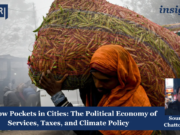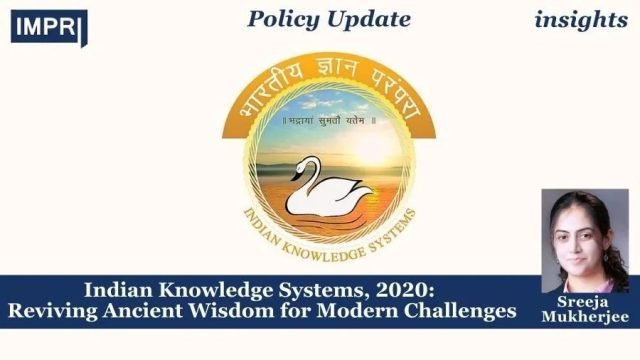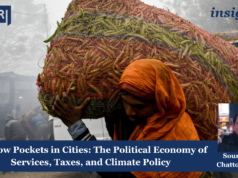Policy Update
Sreeja Mukherjee
Background
In October 2020, the All India Council for Technical Education (AICTE) officially recognized and created the Indian Knowledge Systems (IKS) as an innovative cell under the Ministry of Education. The concept was introduced through the National Education Policy (NEP) 2020, which acknowledged the rich heritage of ancient and eternal Indian knowledge as a guiding principle for education reform.
IKS comprises Jnan, Vignan, and Jeevan Darshan, which have evolved through experience, observation, experimentation, and rigorous analysis over centuries. This effort seeks to advance multidisciplinary research, conserve old knowledge systems, and incorporate this expertise into modern research and educational frameworks to solve present and upcoming difficulties. The primary beneficiaries include students across all academic levels, researchers, faculty members, and society, as the program seeks to mainstream traditional knowledge for practical applications.
Fig.1. Source: https://radiancenews.com/indian-knowledge-system-an-overview/
Functioning
The Indian Knowledge Systems Division operates on three fundamental principles:
- Emphasizing the Bhārata’s unbroken and continuing knowledge traditions, Paramparā (Tradition) acknowledges and preserves the rich history and lineage of Indian knowledge systems passed down through the millennia.
- Dṛṣṭi (Perspective): Recognizing the unique Bhāratīya perspectives present in classical knowledge systems, which are very helpful in addressing contemporary problems.
- Laukika-prayojana (Practical Application): Emphasizing the practical utility of IKS in solving current and emerging problems of India and the world.
The Division coordinates IKS-related interdisciplinary work across various institutions in India and abroad, establishing subject-wise research groups, creating popularization schemes, facilitating project funding, and making policy recommendations for IKS promotion. It also supports establishing IKS centers in educational institutions, offering student internship programs, and developing educational materials to mainstream traditional knowledge.
The implementation process involves multiple stakeholders: the Ministry of Education provides policy direction and funding, educational institutions integrate IKS into their curricula, regulatory bodies like UGC and AICTE issue guidelines, and researchers contribute to expanding the knowledge base.
Fig.2. Source: https://www.iksindia.org/about.php
Performance
Since its inception in 2020, the IKS Division has made remarkable strides in incorporating traditional knowledge into mainstream education. Around 8,000+ Higher Educational Institutions have begun integrating IKS into their curriculum, while 32 dedicated IKS Centers have been established to foster original research and knowledge dissemination. The Division has implemented 75 high-end interdisciplinary research facilities exploring ancient fields like metallurgy, town planning, water management, and Rasayanshastra. Student engagement has been robust, with approximately 5,200 internships offered to undergraduates, complemented by 50 faculty development programs and conferences to strengthen academic expertise.
Significant progress has been made in resource development with the digitization of 1.5 lakh traditional knowledge books. More than six crore citizens have been reached by the Division’s outreach initiatives, primarily through the Dhara Conference series. AICTE’s requirement of IKS courses for first-year engineering students and UGC rules requiring 5% of higher education credits to be related to IKS courses are examples of policy improvements. With an eye toward the future, the Division has developed Vision 2047, which provides a thorough road map for creating a flourishing Bhāratīya Gnana Paramparā in India’s educational system.
Fig.3. Source: https://hindupost.in/education/indian-knowledge-systems-iks-a-transformative-paradigm-in-education/
Impact
Ancient knowledge is now taught alongside contemporary education in classrooms all over India. Students’ eyes brighten as they discover themselves while making the connection between creativity and legacy. Grandma’s remedies and temple architecture serve as stepping stones to identification and future discoveries in these knowledge systems, which are more than merely academic. Research has had a significant rebirth as scientists apply India’s vast traditional knowledge base to address contemporary problems, fostering innovation in environmental science and health disciplines.
The preservation of cultural legacy, such as Indigenous traditions, languages, arts, and sciences, that could otherwise disappear, is greatly aided by this methodical documenting and scholarly engagement with traditional knowledge. International attention has been drawn to the scientific validation of ancient wisdom, establishing India as a unique knowledge center providing unique answers to global problems. IKS-based skill programs like Ayurvedic dietetics, Gandhashastra-based perfumery, and heritage technology create valuable employment pathways for young people.
The sustainability principles embedded in many traditional practices provide relevant approaches to current ecological challenges. According to parliamentary committee findings, institutions incorporating IKS report higher student engagement and improved learning outcomes. India’s ancient wisdom is turning into gold as tourists look for genuine experiences; by 2022, it might generate $1.05 trillion (10% of the $10.5 trillion global tourism market).
Fig.4. Source: https://www.iksindia.org/about.php
Emerging Issues
Despite significant progress, implementing Indian Knowledge Systems faces several interconnected challenges. Standardization remains problematic with a lack of consistent methodologies for validating traditional knowledge and insufficient protocols to integrate IKS with contemporary research in ways that gain global acceptance. Inadequate financing for extensive research and documentation activities and a lack of specialist personnel prepared to teach IKS courses are only two examples of the significant challenges posed by resource constraints.
Integration hurdles persist in the form of resistance from conventional academic circles that remain skeptical about traditional knowledge systems, alongside difficulties in harmonizing traditional teaching approaches with modern pedagogical frameworks. Another hurdle is accessibility, as few high-quality translated resources are available, and language barriers make it difficult to read original publications. Maintaining academic rigor in IKS courses and distinguishing genuine traditional knowledge from pseudoscientific claims are two issues related to quality control.
Key Recommendations
Educational institutions should establish strong faculty development programs, support translation initiatives, and initiate collaborative research projects with international partners; researchers should concentrate on developing methodologies that blend traditional wisdom with modern scientific validation approaches; industry partners should invest in commercializing validated IKS solutions while supporting skill development initiatives based on traditional knowledge systems; and government bodies should establish specialized teacher training facilities, increase IKS research funding, and develop comprehensive quality assurance frameworks to address these challenges.
Fig.5. Source: https://www.mygov.in/campaigns/iks/
Way Forward
Finding a balance between innovation and preservation will be crucial for the future of Indian knowledge systems. Strategic directions include mainstreaming IKS within formal education through required credit components while maintaining quality and relevance; prioritizing research in areas where traditional knowledge offers unique solutions to contemporary challenges in health, agriculture, environment, and technology; and establishing international partnerships to enhance global acceptance of IKS as valid knowledge systems. The acceleration of digital preservation efforts using advanced technologies will improve both preservation and accessibility of traditional texts and practices. Public engagement through expanded Jan Bhagidari initiatives will involve citizens in IKS promotion and preservation through competitions, exhibitions, and social media campaigns, creating broader cultural ownership.
Establishing specialized centers that focus on specific aspects of IKS will promote in-depth investigation and creativity in domains of traditional knowledge. Because it will create sustainable economic models by bridging the gap between conventional knowledge and commercial applications, industry integration is equally important. More than a cultural revival, the revival of Indian knowledge systems holds promise for creative answers to urgent global problems. India can improve its educational and research ecosystem and contribute uniquely to global knowledge systems by skillfully combining traditional wisdom with modern resources.
References
About the Contributor: Sreeja Mukherjee is affiliated with IMPRI and pursuing Masters in International Electoral Management and Practices at TISS, Mumbai.
Acknowledgement: The author extends sincere gratitude to Dr. Arjun Kumar and Aasthaba Jadeja for their invaluable guidance and support.
Disclaimer: All views expressed in the article belong solely to the author and not necessarily to the organisation.
Read more at IMPRI:



















